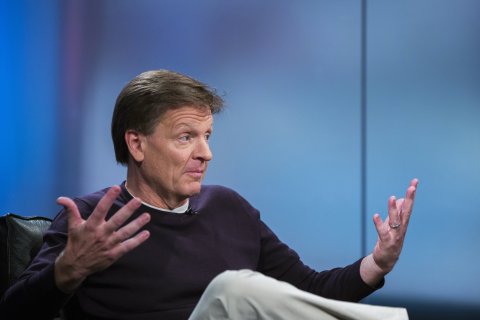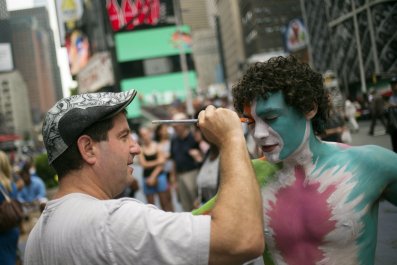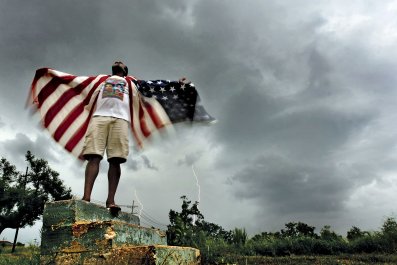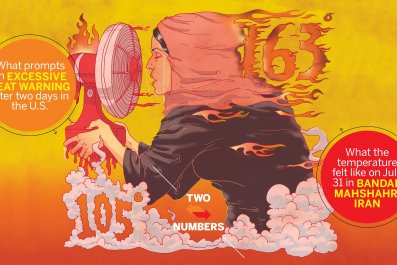At this point, the Wall Street exposé is practically a self-contained literary genre. The latest entry, Straight to Hell: True Tales of Deviance, Debauchery, and Billion-Dollar Deals, is the long-awaited oeuvre of John LeFevre, the author of the parody Twitter account @gselevator.
It's easy to see how a book or movie about the world of finance—something like The Wolf of Wall Street—can find an audience, even while trading in financial arcana and economic policy: The public's anger at income inequality primes the box office and the bookstore for Wall Street-related entertainment. Straight to Hell encapsulates the reasons why the genre is, foremost, just that: entertainment.
"I didn't have a clear agenda other than to write an entertaining book that's fun to read," LeFevre tells Newsweek. "But I didn't want to be totally lacking in substance. Hopefully it achieved combining some crazy stories and also touching on some tough issues."
LeFevre started out as a Salomon Brothers intern in 1998, the summer after his freshman year of college. During a long career that saw him working for Citigroup in New York, London and Hong Kong, he created @gselevator in order to poke fun at Wall Street culture. The idea behind the joke account was to post fake quotes "overheard" in the elevator at Goldman Sachs, as a kind of parody of the 1 percent.
#1: A market sell-off is worse than divorce. I lose half of my money, but my wife is still around.
— GSElevator (@GSElevator) July 3, 2015
LeFevre, who never actually worked for Goldman, has been careful to emphasize the difference between his new book and his Twitter page: "The Twitter account is very clearly designed to make fun of a culture," he says. In contrast the book is more about illuminating one. The mechanism for this is a conversational, episodic first-person narrative that traces his career in finance. It's very readable, though not quite novelistic, and it only stumbles in instances where the present-tense narration blurs the line between commentary and action. This is by design, but it can also undermine our trust, as we grapple with how to justify the author's examination of a culture he participated in.

All this raises an obvious question: Why should LeFevre, or an actual confessed criminal like Jordan Belfort (author of The Wolf of Wall Street), both long-term insiders in the world of finance, be the ones to deliver a muckraking account? Since the books tend to be more successful than your average memoir, it wouldn't be a huge logical leap to suppose that they represent an attempt to profit from what LeFevre himself calls "a potentially evil" culture, a la Vonnegut "profiting" from Dresden. In other words, is this just another scam?
LeFevre says he doesn't want to be disingenuous. As the subtitle tells us, the book is not about Wall Street finance so much as "deviance" and "debauchery." The bulk of LeFevre's material is set in Hong Kong, not Manhattan, but these two themes, according to him, resonate in both places. He describes the Asian capital of finance as a sort of paradise for New York bankers stationed or traveling abroad, a place where a common negotiation strategy is to buy drugs and get prostitutes for clients.
To many of his readers, whatever billion-dollar deals LeFevre helped broker are bound to be an afterthought. "I'm just attempting to illuminate the culture for people to see," he says. In other words, he's not trying to teach you a class on the Securities and Exchange Commission. The selling point here is not information.
"People do seem to get a little bit caught up in this bankers behaving badly stuff," he admits. "Hopefully they [readers] will see the substance…there are some systemic conflicts of interest in the way that bonds get allocated in every single bank, every single day."
The book's stories, which LeFevre says he began to write down in note form from his earliest days as an analyst in training, encapsulate a set of themes familiar to fans of the Wall Street genre: things like cavalier expenditures, offensive jokes told by bosses, latent sexism (and just plain old sex, including with prostitutes), drug use and drinking, collusion and manipulation of clients, and what he labeled "frat guy douche bag behavior" in a live-streamed interview with the Huffington Post. You can't say that LeFevre doesn't know his audience.
From talking to him, one gets the sense that he has no regrets. He doesn't even claim to be a reformed individual, and he didn't write the book in order to change Wall Street culture. He sees his long-term participation—on both the "buy" and the "sell" side of the industry, working with both banks and businesses—as a form of credibility. "I loved working," he said. "I loved the job, the antics, I enjoyed it.… I carried the culture forward."
During the years that LeFevre was in finance, a degree of ironic perspective was the primary thing that separated him from his colleagues, many of whom, he says, are "still in positions of power." He felt a detached cynicism toward financiers who took themselves too seriously. The perception that finance is a meritocracy bothered him; he says that promotions on Wall Street have a lot to do with sharing in lewd jokes and rounds of golf with bosses—not with technical acumen.
A bigger reason that LeFevre left the world of finance, however, was self-preservation: He says that each year spent partying in Asia was taking five off his life span. The job itself also began to take a toll. "I began to have more bad days than good days," he says, like someone from Office Space. An atmosphere he once found gratifying became a source of frustration, so he turned to a different pleasure—writing—and moved to suburban Texas. Would he do it all again? Absolutely.
What all this adds up to is a simple message that book buyers need to know: Don't mistake this book for something it doesn't strive to be. The core themes of Straight to Hell survive attacks on its claims to credibility, and the book is not about boasting so much as entertainment. So should you read it? Maybe. It depends on your appetite for debauchery. If you're interested in the history behind LeFevre's account, you will have a lot of reading to do.

The Wall Street takedown has existed in some form since the 19th century, when Herman Melville wrote "Bartleby, the Scrivener: a Story of Wall Street." Technically, Melville's classic is about a scribe in a legal office, not a financier. Nevertheless, it offers one of literature's most enduring takes on the white-collar culture that was emerging at the time, capturing an atmosphere of mortal anxiety in a soul-crushing business world. It's a gothic tale in which the monsters are humans, which should sound familiar to Gordon Gekko fans. (Young interns on today's Wall Street might be advised to read the story, and to follow Bartleby's example by replying with "I would prefer not to," when presented with the hookers and blow that Jordan Belfort wrote about in this 2013 Newsweek article.)
Other fictional accounts like the novel American Psycho have achieved comparable notoriety. The big screen has sustained the genre through adaptations and original features, such as the aptly titled Wall Street, which helped popularize the phrase "greed is good."
But for LeFevre and many others, Michael Lewis's Liar's Poker was the book that started everything. Published in 1990, Liar's Poker outed the culture of Salomon Brothers, where Lewis had worked as a young Princeton graduate in the 1980s. The book was noteworthy for addressing substantial criminal activities and exposing the personal habits of finance's "big swinging dicks." Ask a finance wiz in his or her mid-20s about Wall Street today (as I did on the corner of Wall and William Streets), and you will likely get the response, "That was just the '80s. It's different now."
That might be true on a macro-scale, but in LeFevre's opinion it's not entirely accurate. "If my book resembles a bygone era, then so be it. But it is very much reflective of the culture, even today."
Regardless of whether they portray reality, Wall Street "exposés" have a curious history of inspiring, not dissuading, younger generations. In an article that he wrote for Portfolio, Michael Lewis said: "Six months after Liar's Poker was published, I was knee-deep in letters from students…who wanted to know if I had any other secrets to share about Wall Street. They'd read my book as a how-to manual." Lewis had hoped that the book would dissuade young graduates from entering the field and encourage them to pursue other careers.
Statistics from the 2010s suggest that college graduates from elite schools, especially the Ivy League, are still overwhelmingly going into finance. As noted in this 2014 Newsweek article, finance claimed a striking 36 percent of 2011 grads from Princeton, while nearly half of Harvard's graduating class of 2010 went into finance and consulting. The Yale student newspaper published an article to the same effect in 2012, and a study last year found that 70 percent of Harvard seniors submit résumés to Wall Street and major consulting firms. "People have a very short memory about the crisis," LeFevre comments. "It's still very prestigious."

Like Lewis, LeFevre often gets solicited for career advice: "People tweet at @gselevator asking me how they can get into finance." He calls these people his "aspirational readers," and suggests that they are missing the point. "Satire is an IQ test," he says. But there could be a different explanation.
Steven Vrooman studies the rhetoric of culture and film at Texas Lutheran University, where he is chairman of the communications department. In an interview with Newsweek, he explained that Wall Street movies have co-opted the techniques of gangster and mob films. "We root for the bad guy," he says, "because we build a relationship with them from the beginning of the movie, learning to identify with them." The privilege of screen time—being the main character—is often sufficient to create an emotional investment in a despicable character.
The same applies to books like Straight to Hell, Liar's Poker and the original Wolf of Wall Street. "Telling a cautionary tale through a first person narrative like that," Vrooman argues, "almost makes it impossible to be cautionary about it. It's hard for people to absorb the larger, abstract critical message, because what we're interested in is the story."
That's why Martin Scorsese's adaptation of The Wolf of Wall Street was simultaneously acclaimed (for its direction, pacing, style and acting) and panned (for its excess, pornography and darkly celebratory tone). Critics and fans debated whether the film was glorifying Wall Street traders, even though it contained exchanges like this.
Alexandre O. Philippe, a documentary filmmaker, argues that filmmakers do have a degree of responsibility for the reception of their films. "If you're dealing with a movie that very specifically is aimed to demonize or at least point the finger at a certain kind of behavior," he told Newsweek, "and the public perception is that the movie glorifies the behavior, then that fault lies with the filmmaker. It doesn't do us much good to say that we're misunderstood."
In spite of its emphasis on the character of Belfort, it's hard to disagree with the assessment that The Wolf of Wall Street, ultimately, was intended to be a cautionary tale.
LeFevre, unlike Leo DiCaprio, insists that he never set out to tell a cautionary tale, and he seems ambivalent about whether the culture of Wall Street "should" be changed at all. He strives "to avoid writing toward epiphany or redemption," which basically means he's not apologizing. His goal is entertainment, but his audience might not be ready to accept that approach. The subject matter in Straight to Hell is chosen because it illuminates bad behavior, but in avoiding judgment it has the capacity to alienate those who go in looking for a moral or informational take. This is the paradox of the Wall Street genre: It forces audiences to ask whether observing the antics of "bankers behaving badly" is a worthwhile venture on its own.
If even Liar's Poker failed to get the message across, then what would a true Wall Street "exposé" look like? According to Vrooman, it would probably have to take a different structure. To create a truly impactful cautionary tale, a film or book would have to "have no protagonist, just a panoply of victims." It would need to create stakes for Wall Street's crimes—against the law, morality, or whatever—that go beyond a game of cat-and-mouse between billionaires and anonymous FBI agents. It might also have to avoid any sort of first-person narration, even the apologetic kind found in Liar's Poker.
Straight to Hell, like other entries in the Wall Street genre, offers a window into a deviant culture, and suggests the mechanisms by which it perpetuates itself, even in today's climate. Being a financier is perhaps not as "cool" for young people as it was in the '80s—many current "frat bros" have chosen to become "frat brogrammers"—and yes, LeFevre says, people are getting fired every day over inappropriate emails and jokes. But the appeal of a glamorous lifestyle persists, even through disasters in the marketplace.
LeFevre cites reading Liar's Poker as a major influence in his career, but he also concludes that the industry simply attracts a certain type of person: "I did have a felonious mentality even before I went into banking."






















